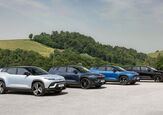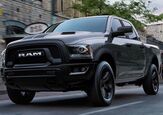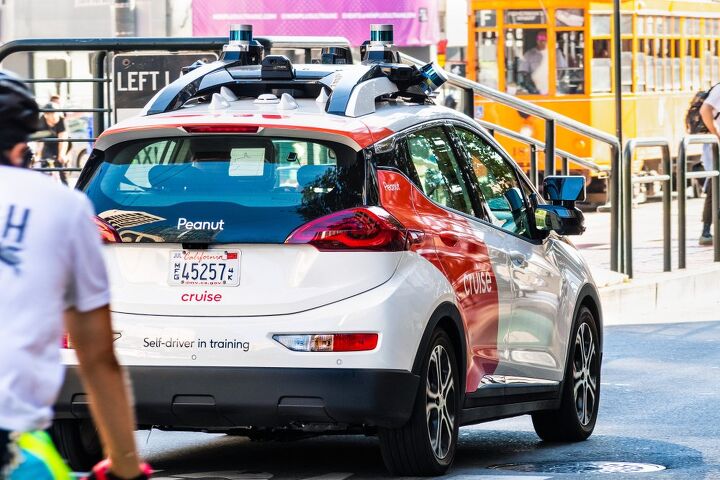GM's Cruise Recalls 300 AVs After San Francisco Bus Crash

General Motors' self-driving arm, Cruise LLC is recalling 300 robo-taxis after one of its vehicles crashed into a San Francisco bus on March 23rd.
The relevant documents were submitted to the National Highway Traffic Safety Administration (NHTSA) on Monday, with the Cruise report stipulating that the collision was caused by "an issue related to prediction of the unique movements of articulated vehicles.”
Basically, the test vehicle didn’t understand how a hinged trailer or segmented bus might move and subsequently failed to predict the course of the vehicle it collided with. But we’ve also provided the verbose and technical-sounding jargon provided by Cruise LLC.
From the Equipment Recall Report:
In certain rare circumstances, the Cruise ADS operating with the Subject ADS Software could inaccurately predict the movement of “articulated” vehicles. This issue could occur when (a) the ADS perceived both the front section and rear section of an articulated vehicle initially; (b) the articulated vehicle then maneuvered in such a manner that the rear section of the vehicle fully obstructed the front section of the vehicle; and (c) the articulated vehicle then decelerated close to the AV within a few seconds of the front section becoming obstructed. In such a circumstance, the ADS could inaccurately determine that the obstructed front section of the vehicle was continuing to move forward, and that the rear section of the vehicle would continue to move forward with the front section, even if the vehicle was decelerating.
This issue resulted in a single collision on March 23, 2023, in which a Cruise AV inaccurately predicted the movement of an articulated San Francisco Municipal Transit Authority (“MUNI”) bus. In this incident, the ADS initially perceived both sections of the bus as the bus was pulling out of a bus stop in front of the AV. As the bus proceeded forward into the AV’s lane of travel, the rear section of the bus obstructed the front section. Shortly thereafter, the bus began decelerating. The ADS inaccurately determined that the bus was continuing to move forward in traffic based on the anticipated behavior of the front section of the bus, which was by then obstructed, and the ADS commanded the AV to begin decelerating too late to avoid a rear-end collision with the bus.
Cruise notified the NHTSA the following day and implemented a software update hoping to address the problem a few days later. While we don’t know if this means GM’s autonomous test vehicles can now accurately predict how “articulated” vehicles might maneuver on the road. This is great news for anyone hoping to tow something while Cruise AVs are on the prowl.
This isn’t the first time regulators have been interested in the company for something you would have thought autonomous test vehicles could handle by now. In December, the NHTSA began investigating Cruise’s driving system to uncover why vehicles were being rear-ended after what was alleged to be sudden and unnecessarily hard braking. There were three such incidents reported. However, we’re willing to believe that the whole matter could be attributed to the human drivers tailgating, even if the AVs panicked and stopped harder than anyone had anticipated.
Cruise CEO Kyle Vogt issued an update on the bus collision earlier this week, saying the company had issued a voluntary recall and already updated the software code. He also recounts what happened and attempts to explain why the test vehicle behaved as it did. Vogt then went on to assure readers that the company would be treating the matter with the utmost seriousness and noted that nobody was injured in what constituted a “minor collision.”
“Although we resolved the root cause in this particular incident, our teams continued to investigate the full extent to which this kind of issue occurred in the past, might occur under a variety of conditions in the future, and might be identified sooner,” stated the CEO. “Our vehicles encounter buses like this one every day, but we’d never caused this kind of collision before. We needed to understand if it was more widespread or isolated to a very unique and rare set of initial conditions.”
“Our data and simulations showed that it was exceptionally rare. At the time of the incident, our AVs had driven over 1 million miles in fully driverless mode. We had no other collisions related to this issue, and extensive simulation showed that similar incidents were extremely unlikely to occur at all, even under very similar conditions.”
[Image: Sundry Photography/Shutterstock]
Become a TTAC insider. Get the latest news, features, TTAC takes, and everything else that gets to the truth about cars first by subscribing to our newsletter.

A staunch consumer advocate tracking industry trends and regulation. Before joining TTAC, Matt spent a decade working for marketing and research firms based in NYC. Clients included several of the world’s largest automakers, global tire brands, and aftermarket part suppliers. Dissatisfied with the corporate world and resentful of having to wear suits everyday, he pivoted to writing about cars. Since then, that man has become an ardent supporter of the right-to-repair movement, been interviewed on the auto industry by national radio broadcasts, driven more rental cars than anyone ever should, participated in amateur rallying events, and received the requisite minimum training as sanctioned by the SCCA. Handy with a wrench, Matt grew up surrounded by Detroit auto workers and managed to get a pizza delivery job before he was legally eligible. He later found himself driving box trucks through Manhattan, guaranteeing future sympathy for actual truckers. He continues to conduct research pertaining to the automotive sector as an independent contractor and has since moved back to his native Michigan, closer to where the cars are born. A contrarian, Matt claims to prefer understeer — stating that front and all-wheel drive vehicles cater best to his driving style.
More by Matt Posky
Latest Car Reviews
Read moreLatest Product Reviews
Read moreRecent Comments
- MaintenanceCosts What is the actual out-the-door price? Is it lower or higher than that of a G580?
- ToolGuy Supercharger > Turbocharger. (Who said this? Me, because it is the Truth.)I have been thinking of obtaining a newer truck to save on fuel expenses, so this one might be perfect.
- Zerofoo Calling Fisker a "small automaker" is a stretch. Fisker designed the car - Magna actually builds the thing.It would be more accurate to call Fisker a design house.
- ToolGuy Real estate, like cars: One of the keys (and fairly easy to do) is to know which purchase NOT to make. Let's see: 0.43 acre lot within shouting distance of $3-4 million homes. You paid $21.8M in 2021, but want me to pay $35M now? No, thank you. (The buyer who got it for $8.5M in 2020, different story, maybe possibly.) [Property taxes plus insurance equals $35K per month? I'm out right there lol.] Point being, you can do better for that money. (At least the schools are good? Nope lol.)If I bought a car company, I would want to buy Honda. Because other automakers have to get up and go to work to make things happen, but Honda can just nap away because they have the Power of Dreams working for them. They can just rest easy and coast to greatness. Shhhh don't wake them. Also don't alert their customers lol.
- Kwik_Shift_Pro4X Much nicer vehicles to choose from for those coins.


































Comments
Join the conversation
Maybe we should regulate these…or better yet, let’s mock-up a fake urban environment and just let these things loose.
Johnnycab should be smarter than that.